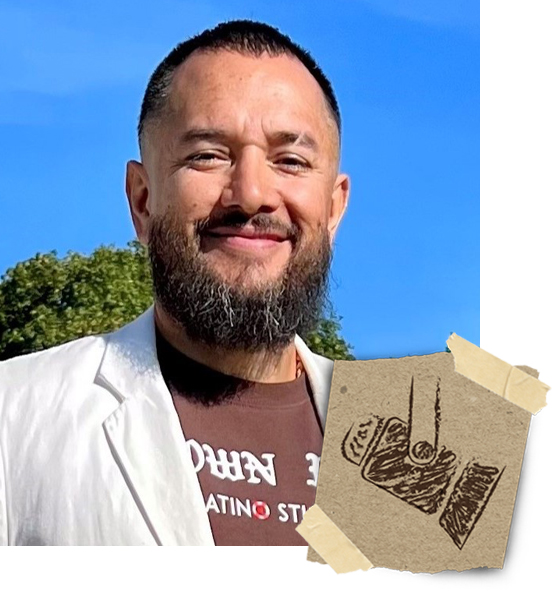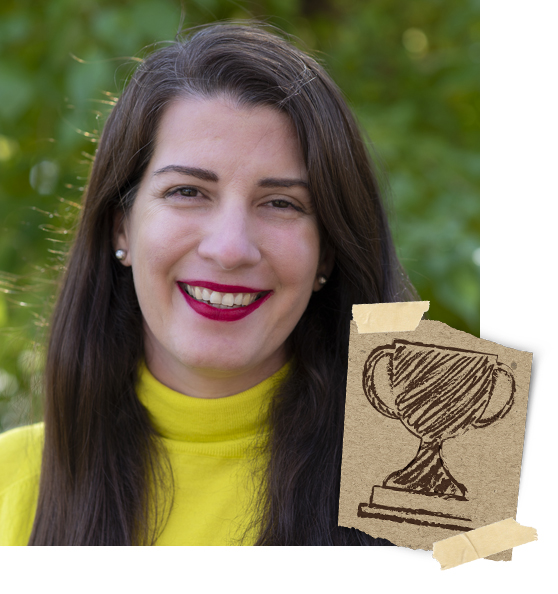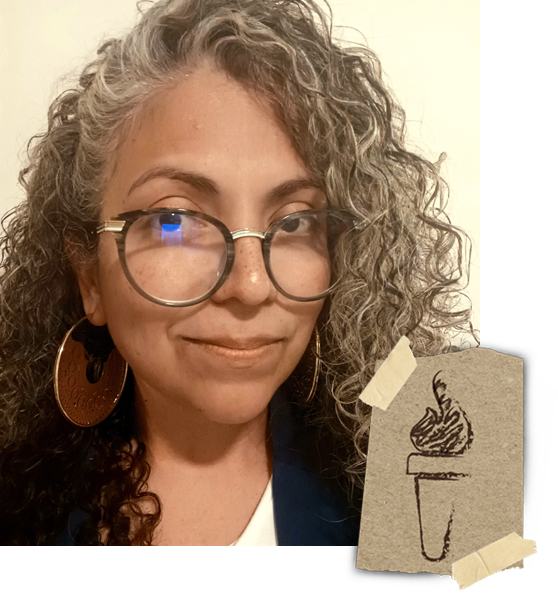Access Spotlight: Juan Flores
September 11, 2024 - Emily Jodway
 Juan Flores is a member of the Office of Cultural and Academic Transitions (OCAT) staff who specializes in Student Success Initiatives. Ever since his own time spent navigating the often daunting experience of life as a student, he has been passionate about increased student support, especially among the minority and first-generation population. Since earning his bachelor’s degree in criminal justice and a master’s degree in clinical social work at MSU, Flores has spent over 15 years in the academic advisory and student affairs realm, advocating for those who often don’t know how to advocate for themselves when they first arrive on campus. He is our Access Spotlight for the month of September as we celebrate Hispanic Heritage Month.
Juan Flores is a member of the Office of Cultural and Academic Transitions (OCAT) staff who specializes in Student Success Initiatives. Ever since his own time spent navigating the often daunting experience of life as a student, he has been passionate about increased student support, especially among the minority and first-generation population. Since earning his bachelor’s degree in criminal justice and a master’s degree in clinical social work at MSU, Flores has spent over 15 years in the academic advisory and student affairs realm, advocating for those who often don’t know how to advocate for themselves when they first arrive on campus. He is our Access Spotlight for the month of September as we celebrate Hispanic Heritage Month.
Flores describes his journey as a "miracle," with events aligning perfectly to enable his success. Born in Mexico, Juan and his siblings were brought to the United States to live in Southwest Detroit in the neighborhood of Mexicantown by their parents, who had been immigrating to America for work. His situation changed rapidly, and he found himself helping his mother run a single-parent household as the oldest of eventually ten siblings. “It was a lot to be exposed to as a child,” he said.
Despite hardships, Flores never stopped being appreciative of what his family had in Detroit. It was still worlds away from his life in Mexico; they had running water, a furnace, and an indoor toilet. They joined a community where they could celebrate their culture, while Flores immersed himself in American culture, eventually playing three sports in high school. But the adjustment to American public school wasn’t easy at first.
“I remember not knowing who I was,” he said. “In Mexico, I went by my middle name as is tradition. No one called me Juan until I got here. I remember dealing with some bullies, and being made fun of for my Mexican attire. I felt, in a way, ashamed of my culture early on when I was young. But I can’t shake it- I am who I am.” I learned to embrace and celebrate my heritage and I am deeply proud of my Mexican ethnicity and everything it represents.
With time, Flores came to recognize school as a sanctuary, with it often being one of the only places where he could eat two hot meals a day. “I developed an appreciation for education,” Flores added. “Everyone in my community always preached the same thing, ‘go to school, stay in school, because we never had access to that.’”
In fact, Flores was the first of his family to graduate high school. Throughout this time, until he earned his green card his junior year, he ‘lived and moved in fear’ of his undocumented status being discovered. Flores persevered in large part for his family. “One of the things that really helped me out was knowing that I was the eldest, and every choice I made they were going to view as an example,” he explained. “It forced me to make really tough decisions every day, to choose the right one.”
He faced challenges every day that threatened to throw him off track, but Flores has a strong connection to his faith, and felt that every time he was presented with an opportunity to participate in delinquent or questionable behavior, divine intervention would always steer him away. He would also always consider the words of the elder immigrant community he grew up around.
“They were always giving me advice,” he said. “They would always say, you gotta learn English, go to school … You’re in America, this is where you can make your dreams come true. All of that over time, hearing it from different elders in the community with low-income jobs trying to feed their families, it just really made me think about my future.”
One opportunity that he considers especially life-changing was his earning of a job in seventh grade. Sent down to the corner store by his mother to buy tortillas, Flores walked into the store to find empty refrigerators and extra product overflowing with no employees to stock the shelves. He was approached by the store owner and eagerly accepted his first job.
“That really changed things for me, because at that point, I was able to feed myself, clothe myself, and it removed another mouth to feed, another responsibility, for my mom,” he said.
Flores finally crossed the stage on graduation day, with newfound ambitions to continue his education. A recruiter from Michigan State, Lucinda Briones, visited his high school and helped persuade Flores to consider college. Flores was homeless during that spring and summer before freshman year, but worked hard to stay afloat and complete his studies with the help of campus resources. He still remembers the day he got a knock on his dorm room door from Crystal Ibarra, whom he learned was a student from the Office of Racial and Ethnic Student Affairs (ORESA) minority aid program tasked with welcoming historically marginalized students to campus and helping them become acclimated. “It felt so good getting a visit,” he said.
“It just created a welcoming vibe that I belonged here at MSU, and that there are things and places and resources and events for me to engage in that can help me navigate this institution. It made the transition a lot easier. As soon as I could, I applied to be one myself.”
This is what first sparked in Flores an interest in student outreach and support. While he graduated with a degree in criminal justice, after talking with a friend in the minority aid program who was applying for his master’s in social work, Flores was inspired to apply as well and got in. As soon as he earned his second degree, he landed his first job as an academic advisor for the College of Natural Science. Closer now to his goal, Flores kept a keen eye on opportunities in the Office of Cultural and Academic Transitions (OCAT), formally known as (ORESA). Eventually earning the role he is currently in.
‘Life-changing,’ ‘rewarding’ and ‘exciting’ are just a few of the words Flores uses to describe his career. “It’s part of my identity, I live for service in a way,” he said. “In higher ed, you’re serving students. You’re ensuring that you’re giving them the resources, the things they need to transition and succeed and graduate.”
One of his favorite parts is the events he gets to put on, such as the Annual Thanksgiving Unity Dinner, or ‘Homiesgiving’ as Flores calls it, a large Thanksgiving dinner held at the MSU Union for students staying on campus over the Thanksgiving break. Flores is also the advisor for Culturas de las Razas Unidas, the Latinx student government group. He coordinates another group, Latinos Unidos, which helps male, man, masculine-identifying Latinos navigate their lives both in and outside the classroom.
“The goal is to try and close these achievement gaps that exist,” Flores said. “There’s a reason why they exist, and I feel like OCAT is at the forefront of ensuring that these populations that fall through the cracks have the support that they need to successfully navigate the institution and graduate.”
He added, "Being the main point of contact for these Latinx student success initiatives is incredibly meaningful to me. Coordinating opportunities that mirror the support I received as a student is especially important because I have personally experienced similar challenges."
During Hispanic Heritage Month, Flores says it is important to recognize the significant contributions Hispanic people have made to this country, and that the impact of their differences, ethnicity, heritage and culture make us all stronger. But the community is still dealing with racism, exclusion and stereotyping, despite the deep diversity among them. “There are 21 Latin American countries, yet, we often get grouped together simply as ‘Mexican’ across the country,” he said.
On a personal level, he wishes he could go back to the time when he was a little boy growing up in Mexicantown and thank all of the elders in his community that encouraged him and helped him stay dedicated to working towards a better life.
“To be the first in my family to reach what I’ve reached, to be in higher ed, to get two degrees … That’s a big deal. I’m an answered prayer to them, because none of them had the opportunities that I had and were able to accomplish what I’ve been able to accomplish. But I know they dreamed of it. I know that generations ago, they were thinking, ‘there’s got to be something better for our future generations, for them to do better than we did.’ So here we are now, staying positive, and living with purpose.”
Honorees’ views are their own and do not necessarily reflect those of the College of Social Science.
Read more:

Access Champion
Faculty/Staff
Dr. Maria Isabel Ayala
Maria Isabel Ayala, Director of the Chicano/Latino Studies Program and Associate Professor in the Department of Sociology, is our September Access Champion. Ayala researches many aspects of the Latinx population, including sociodemographic behaviors, intra-group diversity and Latinx experiences in higher education. Her humanistic and social justice commitment and dedication to inclusivity shape both her research and teaching.

Access Torch
Student
Teresa Rivera
Teresa Rivera is our September Access Torch. Rivera is a PhD student in the Department of Sociology and the Chicano/Latino Studies Program. Her research interests include understanding the lived experiences of Latino immigrants, individual and collective conceptualizations of trauma, the duality of resilience, and how U.S. mental health interventions can holistically support the needs of the Latino immigrant community.

Access Matters
We strive to cultivate an inclusive and welcoming college environment that celebrates a diversity of people, ideas, and perspectives.

